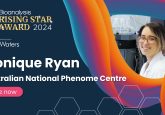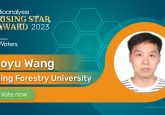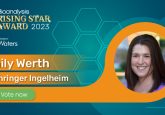Bioanalysis Rising Star Award finalist: Karan Agrawal
Nominated by: Wenying Jian, Director of Bioanalytical Discovery and Development Sciences, Johnson & Johnson (PA, USA)
Supporting comments:
“Karan’s research during his tenure at Johnson & Johnson since 2021 has focused on three areas: biomarker quantitation, oligonucleotide bioanalysis and target engagement assay development, all of which present great challenges and lack consensus on bioanalytical strategy. Karan took systematic approaches and developed elegant workflows to overcome these challenges, including assessing parallelism for protein biomarkers, developing an ultra-sensitive hybrid liquid chromatography–mass spectrometry (LC–MS) workflow for siRNAs, and specifically measuring bound/total target. He has demonstrated outstanding capabilities of proactively and creatively developing innovative approaches and executing them flawlessly to solve complex problems. The workflows he developed were not only applied to Johnson & Johnson programs to enable drug candidate selection, but were also shared with the broader bioanalysis community through publications and presentations, and have laid the foundation for consistent approaches for developing hybrid LC–MS assays for various bioanalytical endpoints. Internally, Karan has become an indispensable member of the team, and is expanding his responsibilities and leading many initiatives on innovation, automation, bioanalysis strategy and workflow optimization. Externally, Karan is gaining significant visibility by his strong presence in various working groups, conferences and workshops. With his passion for science, creativity and enthusiasm to share, Karan is growing into of one the most valued members of bioanalysis community.”
Describe the main highlights of your bioanalytical work
My bioanalytical work has focused primarily on LC–MS-based methods. In graduate school I developed a targeted LC–MS/MS lipidomics assay to characterize the bioactive lipid profile of human sweat and identified potential biomarkers for atopic dermatitis using non-invasive sampling. In industry, I have supported multiple method developments for small and large molecules and supported SL–RT–qPCR method developments for oligonucleotides. My recent bioanalytical work has focused on the development of hybrid LC–MS methods for the analysis of protein biomarkers and oligonucleotides. With respect to protein biomarkers, I combined concepts and practices from both LC–MS assays for small molecules and ligand-binding assays for large molecules to develop a simple four-step workflow that helps assess and account for multiple forms of parallelism inherent to hybrid LC–MS assays for endogenous proteins. With respect to oligonucleotides, I developed the first hybrid LC–MS assay for siRNAs that utilized locked nucleic acid (LNA) probes to capture the antisense strand of the siRNA, and achieved sensitivities ~20x lower than existing LC–MS assays, and close to that obtained by qPCR assays. I was also able to demonstrate that hybrid LC–MS assays offer comparable concentration data to other common oligonucleotide bioanalytical assays, but are specific for the parent compound.






